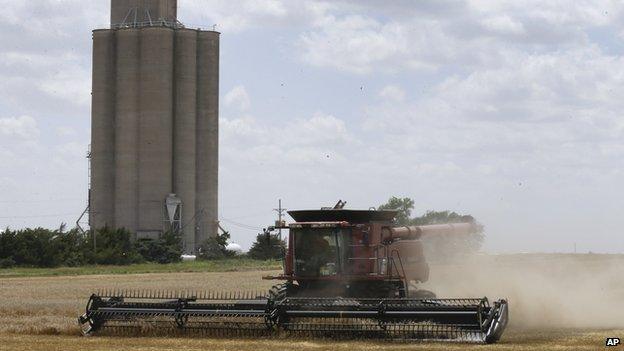The Vocabularist: How did 'silo' get to mean something else?
- Published

The metaphor of silos - tall, grand, side-by-side yet sealed off- for a kind of business organisation is a very graphic one.
People used to know of two main kinds of silos - for grain and for missiles - but now it's used in a very different way, writes Trevor Timpson.
Radio listeners may have been startled to hear a director of Christian Aid say that debates on world poverty and the environment were "two silo kind of arguments".
Of course silos - huge stores for grain, fodder, cement and other materials - can be associated with food and with large-scale farming - but that is not what she meant.
Recent days have seen a US civil rights activist say "we can no longer contain our common message to our individual silos, external" and Cabinet Office Minister Matt Hancock said "policy increasingly needs to break down the silos", external.
"Silo" is only recorded in English from the 19th Century but has been used to mean an underground food store in Spanish since the 11th Century. A "silo" was not always used for food - some medieval Spanish writers used it to mean "a dungeon".
Many reference books say the Spanish word comes from the Greek "siros" - which meant a food storage pit at least as far back as the orator Demosthenes, external (384-322 BC) and was adopted into Latin as "sirus".
Most Spanish words come from Latin so the fact that the Latin word nearest to "silo" means the same thing is hard to ignore.
But the supposed change of r to l from "sirus" to "silo" worries experts, who know the rules on how words change are surprisingly inflexible. So some have suggested other links, to Basque or Celtic, for the Spanish word.

Silo has long meant "underground pit", like this one built to house missiles in Russia
Silo can still mean an underground pit, as we see from the term "missile silo", in use since the 1950s.
But it was above-ground silos, often grand and dominant in countryside scenes, which began to be used in the US Midwest from the 1880s, external, that gave Phil S Ensor his idea for the term "vertical silo syndrome".
Ensor, a former director of Goodyear, wrote in 1988 that silo syndrome means "people across the organization do not share common goals… communication is heavily top-down, on the vertical axis., external Little is shared on the horizontal axis."
It is a very good metaphor indeed. Rural banks of silos, often tall and dominating, parallel, side-by-side but sealed from each other,, external depict isolated up-down hierarchies in a company well.
But when good metaphors go to the bad, they become cliches. Now "silo" is often used to mean "something isolated" with little thought of the original visual likeness.
People have now heard minister Eric Pickles say "you have a moment of liberation where the silos go", external and someone else say that the restaurant business was "a patchwork of on site silo'd applications", external.
But that is not the fault of Phil Ensor, let alone Demosthenes.

The Vocabularist
•The Greek roots of the word 'eurosceptic'
•The complicated history of the word 'bribe'
•Where did the word 'deflation' come from?
• How we got 'parliament' from 'parabola'
Select topic "language" to follow the vocabularist

Subscribe to the BBC News Magazine's email newsletter, external to get articles sent to your inbox.